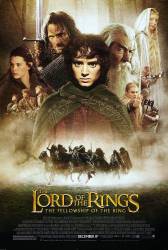Question: What is the significance of tearing the trees down at Isengard?
Chosen answer: The orcs burn the wood for power to create the Uruk army. It acts as a metaphor for technology destroying nature. And it is what causes the Ents to join the war in The Two Towers.
Answer: There is a clasp on the chain, which can be seen in shots in all three movies. However, as noted in several mistakes on this site, there are some shots where The Ring is inexplicably off the chain in subsequent shots.
Question: Does anyone know of any good sites about all three of the movies?
Answer: www.lordoftherings.net is a great one.
Question: How long do hobbits live? Bilbo was 111 and that was old for a hobbit but in this section someone answers that Frodo was 50 and he didn't look that old to me.
Answer: In the books, Bilbo becomes the oldest hobbit that ever lived at the age of 131. In the books, Frodo is fifty - but the main events of the storyline occur seventeen years after Bilbo's birthday party. In the film, the gap is unstated, but seems to be less than a year, so the film Frodo is probably intended to be in his early-to-mid thirties, considered a young adult in hobbit terms.
Question: Since the success of the Fellowship was so important, why didn't the Elves give the members of the Fellowship Mithril shirts to better protect them? It saved Frodo a few times and would have saved Boromir too.
Answer: Well the elves dont have mithril shirts, the dwarves did, ages ago. Moria (the mine the fellowship travels through) was the only place where mithril metal could be found, of course it was invaded by evil and the supply of mithril was shut off to the world. So mithril in the time of the fellowship was extrodinarily rare. At one point in the extended edition Gandalf remarks that the shirt that Frodo is wearing is worth more than the entire shire, this is how rare mithril is.
Question: Does anyone know who decided on the musical scores for the movies? I know that Enya and Howard Shore contributed most of the music, but were there any other choices that were considered? Mostly I'm wondering if The Lord of the Rings Symphony (by Johan DeMeij) was ever considered, or if there was some kind of copyright issue surrounding the usage of the symphony.
Answer: An original score was the only thing ever considered.
Question: I know that Arwen's mother is Celebrain (daughter of Celeborn and Galadriel) since she was married to Elrond, so my question is where is her mother now? And also where are her brothers (Elladan and Elrohir)? Or is this just a book/film difference?
Answer: Celebrían was attacked by orcs in the Misty Mountains and was rescued by Elladan and Elrohir. She passed into the West soon after. Elladan and Elrohir do not appear officially in the films, though some have argued that this elf or that elf could be them in the Council of Elrond scene.
Question: In the beginning of the film Galadriel says that Bilbo's finding of the ring was something that "the ring did not intend." Later in the film Gandalf tells Frodo that Bilbo was meant to find the ring. I have not read the books, but both statements can't be true. So what's the real story with Bilbo and the ring?
Question: This is a question for the extended edition DVD. Does anyone have a translation of the insult Gimli says to Haldir in Lothlorien?
Answer: According to Elvish.org, Gimli says in Dwarvish, "Ishkhaqwi ai durugnul." It translates into "I spit upon your grave."







Chosen answer: The people who have said such a thing are incorrect. Tolkien stated that the work's inspiration was primarily linguistic in nature, and strongly disagreed with the meanings that other people saw in the books - the Ring as allegory for the nuclear bomb, et cetera. Tolkien's exact words, from a foreword to one of the editions of the books: "As for any inner meaning of 'message', it has in the intention of the author none. It is neither allegorical nor topical....I cordially dislike allegory in all its manifestations, and always have done so since I grew old and wary enough to detect its presence. I much prefer history, true or feigned, with its varied applicability to the thought and experience of readers. I think that many confuse 'applicability' with 'allegory'; but the one resides in the freedom of the reader, and the other in the purposed domination of the author."
Phil C.